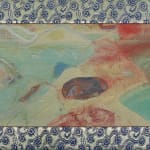Nilima Sheikh Indian, b. 1945
Your History Gets in the Way of My Memory, Reading Agha Shahid Ali 3, 2003
Tempera on sanganeri paper, mounted on silk brocade
9 x 27.5 in
23 x 70 cm
23 x 70 cm
Copyright The Artist
Further images
Like painting, poetry has the ability to reach the core of emotions, freed as it is from the rational, the logical, the conscious. Our lives are now almost entirely colonized...
Like painting, poetry has the ability to reach the core of emotions, freed as it is from the rational, the logical, the conscious. Our lives are now almost entirely colonized by language, almost nothing that we experience is not meditated by the word. Painting can free us from this tyranny & poetry is language freed of such tyranny.
In her attempt to understand the plight & reality of Kashmir, Nilima Sheikh was drawn to the work of Agha Shahid Ali, the poet of Kashmiri origin. In two published collections of his poems (The Country Without a Post Office & Rooms Are Never Finished) Ali specifically addressed the trauma that has engulfed Kashmir since 1990, articulating the complex inter weavings of pain, guilt, remorse, loss, confusion, terror and desire brought on by the situation.
Ali’s poetry is often sublimely visual and easily ignited Nilima’s imagination. His verses routinely contrast the natural beauty of Kashmir with the ugliness faced due to the abhorrent actions of human beings there. Many phrases, taken out of context, seem to be exhortions to Nilima to paint: “Smashed Golds”, “Petrified Reds”, “ A Jade Rain”, “Black on Edges of Flames” are actual hues which travel from Ali’s sonnets to Nilima’s brush. One painting is entirely bathed in a crimson of “Blood Sheer Rubies”, while in another Nilima literally renders the “ash filigrees, roses carved in the wood of weeping trees”.
Nilima’s paint handling is such , colours lightly graze over the ground, figures often transparent, traces of forms stippled into being but only barely seen. This is served only too well by Ali’s verse: “In the smoking oil of dimmed headlights, time dissolved – all winter – its crushed fennel.” Nilima & Ali seem to collaborate on the creation of pigments from all manner of substances, his metaphors describe perfectly her hues, tones and brushes.
In her attempt to understand the plight & reality of Kashmir, Nilima Sheikh was drawn to the work of Agha Shahid Ali, the poet of Kashmiri origin. In two published collections of his poems (The Country Without a Post Office & Rooms Are Never Finished) Ali specifically addressed the trauma that has engulfed Kashmir since 1990, articulating the complex inter weavings of pain, guilt, remorse, loss, confusion, terror and desire brought on by the situation.
Ali’s poetry is often sublimely visual and easily ignited Nilima’s imagination. His verses routinely contrast the natural beauty of Kashmir with the ugliness faced due to the abhorrent actions of human beings there. Many phrases, taken out of context, seem to be exhortions to Nilima to paint: “Smashed Golds”, “Petrified Reds”, “ A Jade Rain”, “Black on Edges of Flames” are actual hues which travel from Ali’s sonnets to Nilima’s brush. One painting is entirely bathed in a crimson of “Blood Sheer Rubies”, while in another Nilima literally renders the “ash filigrees, roses carved in the wood of weeping trees”.
Nilima’s paint handling is such , colours lightly graze over the ground, figures often transparent, traces of forms stippled into being but only barely seen. This is served only too well by Ali’s verse: “In the smoking oil of dimmed headlights, time dissolved – all winter – its crushed fennel.” Nilima & Ali seem to collaborate on the creation of pigments from all manner of substances, his metaphors describe perfectly her hues, tones and brushes.
Exhibitions
2003 The Country Without a Post Office: Reading Agha Shahid Ali, Chemould Prescott Road, Mumbai, IndiaSign up to receive the latest news about exhibitions and artists
* denotes required fields
We will process the personal data you have supplied in accordance with our privacy policy (available on request). You can unsubscribe or change your preferences at any time by clicking the link in our emails.





